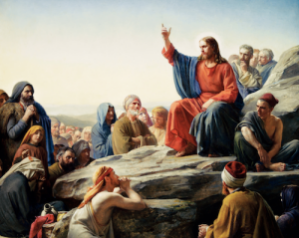At the October, 2015, Annual Meeting of Jehovah’s Witnesses, the Governing Body put forward yet another revision, in what has become an annual, piecemeal revision of prophetic interpretation. All of which is attached to 1914 in one way or another.
The most recent “adjustment” has to do with when Christians went into captivity to Babylon the Great, which was the topic of the October 31st Daily Commentary.
Conveniently, the topic also just so happened to come up in the Questions from Readers column in the March 2016 Watchtower. (The timing of the article would suggest that the questions are not always from readers.)
For the uninitiated here is what the WT used to teach, taken from the article linked above:
For a number of years, we explained that this captivity began in 1918 and involved a brief period of time when God’s people came under the control of Babylon the Great. For example, The Watchtower of March 15, 1992, stated: “Yet, as God’s ancient people were taken into Babylonian captivity for a time, in 1918 Jehovah’s servants came into a measure of bondage to Babylon the Great.” However, further research has shown that this captivity began much earlier than 1918.
After “further research” what are Jehovah’s Witnesses required to believe now? The article concludes with:
Given these facts, it becomes clear that God’s people went into captivity to Babylon the Great with the growth of the apostasy in the second century C.E. This was a dark period of time, similar to what the ancient Israelites experienced while in exile. How happy we can be, though, that after God’s people experienced centuries of spiritual oppression, we are living in the time when “those having insight will shine . . . brightly” and “many will cleanse themselves” and they “will be refined”!
It is true that Christianity gradually became corrupted from within and the bishops were eventually subverted by Roman Emperor, Constantine, and thereafter what passed for Christianity became increasingly infused with the religious ceremonies and mythical beliefs associated with Babylon. But here are some things to consider.
First, when Jehovah had Judah taken into captivity it was punishment from him and it served to vindicate his word. That is because the prophets announced that Jerusalem would fall to Babylon years in advance, due to their refusal to obey God and keep their sworn covenant with him. And when it occurred the surviving Jews were forced to “know that I am Jehovah.”
To illustrate the point, in the 12th chapter of Ezekiel God said:
And they will have to know that I am Jehovah when I disperse them among the nations and I scatter them among the lands. But I will spare a few of them from the sword, the famine, and the pestilence, so that they may tell about all their detestable practices among the nations where they will go; and they will have to know that I am Jehovah.”
But did the Christians who came under the influence of the Roman religious authority come to know that Jehovah had punished them or why? Although the apostles foretold that Christians would be subjected to cruel shepherds who would not treat the flock with kindness, there is nothing to suggest that such was punishment from God.
Furthermore, the Jewish exile in Babylon did not span thousands or even hundreds of years. In fact, it could be said that the generation that experienced the destruction of Jerusalem did not pass away until they had returned back to their homeland to rebuild Jehovah’s temple. That some individuals experienced that very thing is evident by what the prophet Haggai was inspired to ask the people who were on hand when the second temple was finished:
“Who is left among you who saw this house in its former glory? How does it look to you now? Does it not seem like nothing in comparison?”
But the foremost absurdity in the Watchtower’s adjusted understanding is that the desolation of a holy place and a symbolic “Jerusalem” is one of the central features of the time of the end. And while the Watchtower’s “prophets” insist that “Jerusalem” represents Christendom, why would it be necessary for the chosen ones to flee for their lives when the disgusting thing stands where it ought not?
And did not Jesus indicate that the reader ought to use discernment and consult the book of Daniel, which clearly reveals that the holy place that is to be desolated has to do with the things belonging to God? And even the Watchtower acknowledges as much.
But what does the desolation of the holy place have to do with going into captivity to Babylon the Great?
As Jehovah’s Witnesses well know, at the time when Babylon destroyed Solomon’s temple Jerusalem was known as the place where Jehovah had caused his name to reside. It was a terrible loss for the people of God. In response to that horrific calamity the prophet Jeremiah wrote the book of Lamentations, lamenting the destruction of the holy city.
What is more, when Jesus pronounced woe upon Jerusalem he also recognized it as the holy city, calling it such, and referring to the temple as the ‘house of my Father.’ Therefore, it is not reasonable that the antitypical “Jerusalem” would represent Christendom.
Since it was the desolation of Jerusalem that brought the Jews into captivity to Babylon, the future desolation of the holy place will bring about the circumstance, whereby Jehovah’s people will be oppressed by the eighth king and the harlot, Babylon the Great.
Since it can be easily demonstrated that the eighth king has not commenced his reign for the symbolic “one hour”, the command to “get out of her my people” has not been heralded. Clearly, at that critical point during God’s judgment getting out of Babylon the great will not have anything to do with discarding false religious doctrines. It will involve accepting the Kingdom of God as it will manifest itself then.
As for the question posed by the Watchtower: “When were God’s people held captive by Babylon the Great?” It is the wrong question. More correctly, we should ask: When are God’s people going to be held captive by Babylon the Great?
The answer is, just as God entered into judgment with the Jews by means of the sword, famine and pestilence, with the authentic opening of the symbolic seals of the Disclosure Christ will commence the judgment of the house of God, accompanied by war, food shortages and global pandemics. The worldwide work of Jehovah’s Witnesses will be suppressed. And by that means Babylon will prevail over the people of God until such time as the Greater Cyrus stands up as the deliverer.



